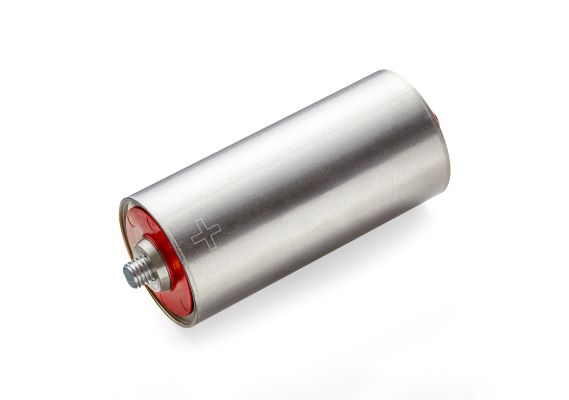Designed to meet the rigorous requirements of the mobility, industrial, and aerospace sectors, the new cell, with a capacity of 22 Ah, demonstrates a specific power of 2,550 W/kg under continuous discharge conditions

Diversified global manufacturer Asahi Kasei and German battery manufacturer EAS Batteries signed a license agreement for the use of Asahi Kasei's acetonitrile-containing electrolyte technology. The electrolyte will be used in EAS' novel ultra-high-power lithium-ion battery cell using lithium iron phosphate (LFP) cathode.
The electrolyte's high ionic conductivity contributes to reduced internal cell resistance and enhanced rate capability, even under demanding temperature conditions. The market launch of EAS Batteries’ new cell utilizing this technology is in line with Asahi Kasei’s commercialization plans, with the product scheduled to be released no later than March 2026.
The development of the new cylindrical, ultra-high-power cell, UHP601300 LFP 22, is based on a collaboration between Asahi Kasei and EAS Batteries, with financial support from Germany’s Federal Ministry of Research, Technology, and Space under the “HEADLINE” project.
Under this collaboration, Asahi Kasei designed its electrolyte technology to target demanding applications in marine, railway, and construction machinery. This innovative breakthrough was made possible by leveraging the company's expertise with over three decades of lithium-ion cell research and development.
Designed to meet the rigorous requirements of the mobility, industrial, and aerospace sectors, the new cell, with a capacity of 22 Ah, demonstrates a specific power of 2,550 W/kg under continuous discharge conditions. This is approximately 60% higher than that of cells using conventional electrolytes. It also delivers an impressive 3,760 W/kg under a 2-second pulse discharge, representing a 10% improvement. In addition, the cell exhibits a cycle life of 2,400 cycles at 5C/5C (100% DoD) at room temperature before reaching 80% of its initial capacity. This performance was demonstrated by testing with the charge and discharge current set at 110 A, which corresponds to a fast full charge and discharge cycle completed in just 24 minutes. The reduced internal resistance of the new cell also results in lower heat generation during cycling and improved energy efficiency compared to cells using conventional electrolytes.
Asahi Kasei and EAS Batteries have agreed to sublicense their combined technologies to global OEMs and battery manufacturers, aiming to expand into mobility applications.
Michael Deutmeyer, Managing Director of EAS Batteries GmbH, comments on the collaboration: “Our collaboration with Asahi Kasei sets a strong foundation for advancing cell quality and performance especially for high-power cells. The robustness of the electrolyte is key—not only for EAS products but also for scaling our technology across markets. Strategic partnerships like this enable tailored solutions for future demands.”
“We are proud to provide high ionic conductivity electrolyte technology that contributes to battery cells which set a new benchmark for high power output,” said Osamu Matsuzaki, Senior Executive Officer of Asahi Kasei and Head of Corporate R&D and IP. “By combining our technology with the expertise of EAS, we achieved an advanced cell design with unprecedented performance. As energy systems transform worldwide, I am confident that our technology will enable the further development of high-performance cells with clear competitive advantage.”
Subscribe to our newsletter & stay updated.